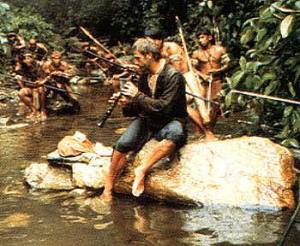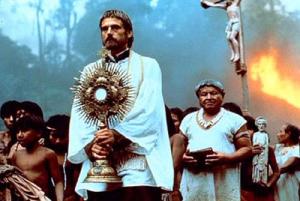The Mission
The Mission is a great example of how true facts can be altered to provide a more entertaining study of historical events. In discussing The Mission I hope to make clear some of the historical facts and inaccuracies that are the background to this film.
During the 17th century Spain’s status and power was deteriorating. By 1750 Spain is forced to sell some of its colonies to other countries. Under the Treaty of Madrid 1750, Spain sold territory to Portugal that included seven Jesuit missions and areas that were inhabited by the Guarani. This point in history is where The Mission begins its story.
The Jesuits, a Catholic religious order that focuses on education, and the establishment of schools and colleges, began their missionary work in Paraguay in 1610, and at first were accepted by the Guarani. The Guarani accepted the Catholic missionaries because they received protection from their enemies, both native and European, as well as received iron tools and supplies that helped to modernize their primitive lifestyles. But this fairly conciliatory relationship would not last.
In the beginning of the film, a Jesuit priest is tied to a log by the Guarani and thrown into to the river were he eventually dies going over the falls. As this scene is playing the narrator describes how the Jesuits are here to carry the word of God to those in a natural state and all that they receive in return is martyrdom. However, Jesuits are historically known for persuading, bribing and even forcing the Guaraní into their missions. And the Guarani that go into these missions were not free and were subjected to discipline and encomienda. It is known that some of the mission residents fled north to where the government allowed them to sell their services for money, a practice that was forbidden by the Jesuits. Martyrdom is not the word I would have chosen- maybe justification would have better described the reasoning behind this attack against the Jesuits.
The Guarani Indians are aboriginal tribes that were farmers that hunted to supplement their crops. In the film we see the Guarani joining the mission and working together equally with the Jesuits to grow crops, make instruments and build the missions. However the Guarani did not have equal rights. Historically the Jesuits supervised the mission’s harvests, surpluses and the selling of their products. The Guarani wanted more involvement in the affairs of the mission but were denied by the Jesuits. They could not even remove food from the warehouses without getting permission from the Jesuits. This treatment of the Guarani was not unlike the treatment they received from the mercenaries that captured them and sold them to Spain and Portugal as slaves. Settlers who enslaved the Guaraní justified it under the rules of encomienda originaria and the Jesuits would use the cover of the Catholic Church to explain their actions. In reality the Jesuits actually aided and abided the imperialization of Paraguay and other Latin American countries.
The Mission has glorified the role that the Jesuit order took during this time. They were not just there to bring the word of God to the Guarani, but to bring prestige and prosperity to their order, using the Guarani as a disposable commodity. The Guarani did not have a voice when this occurred, and ironically they did not even have a voice in the movie that was depicting the atrocities that fell upon them.
I enjoyed this film, however after reading the articles for this class, the true history that was omitted from this film made the enjoyment for the production, not the historical content.

